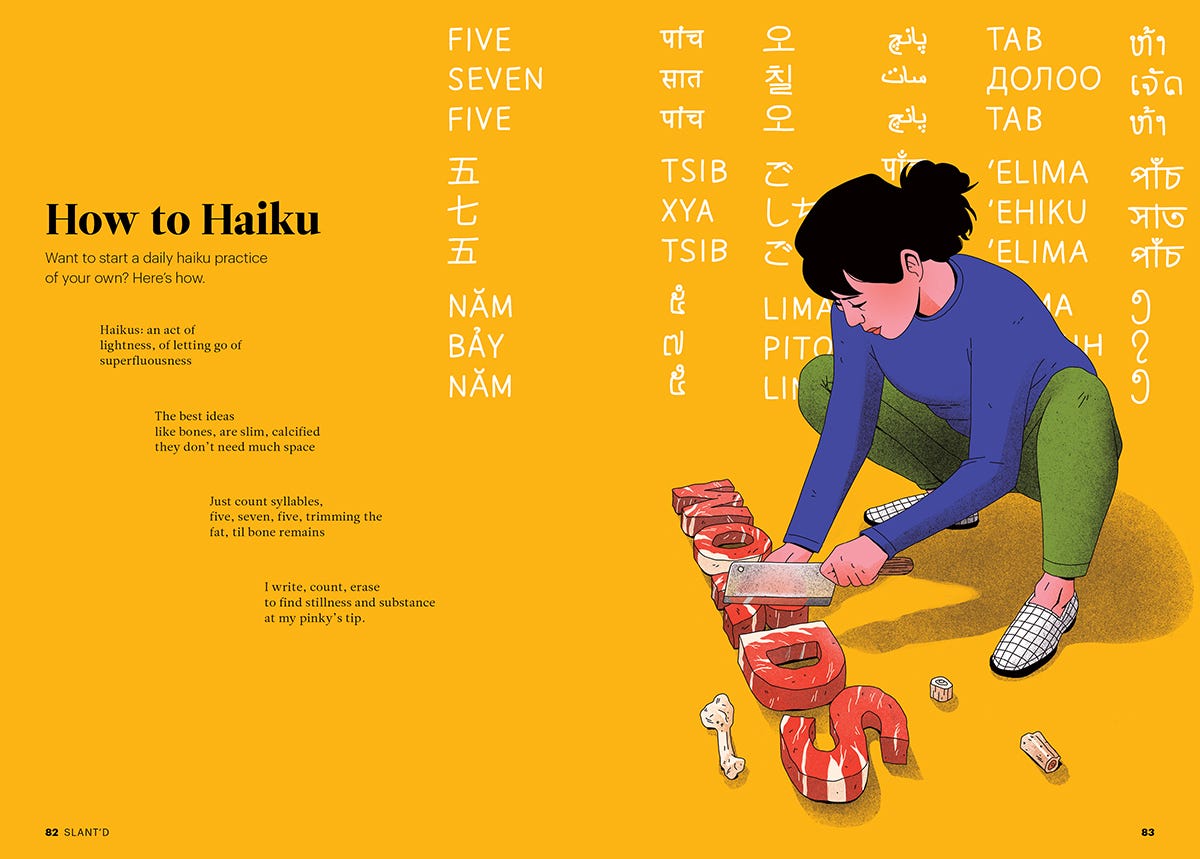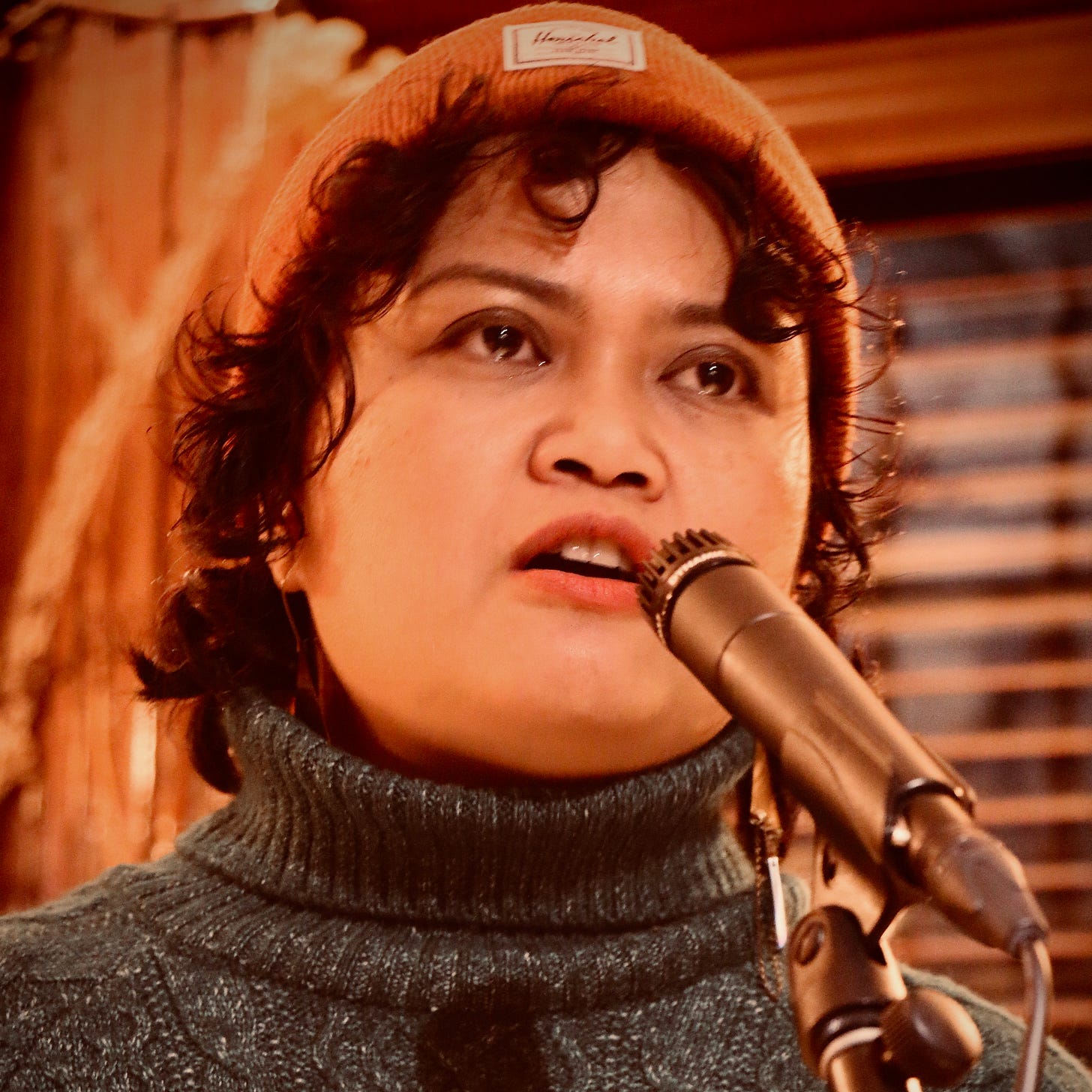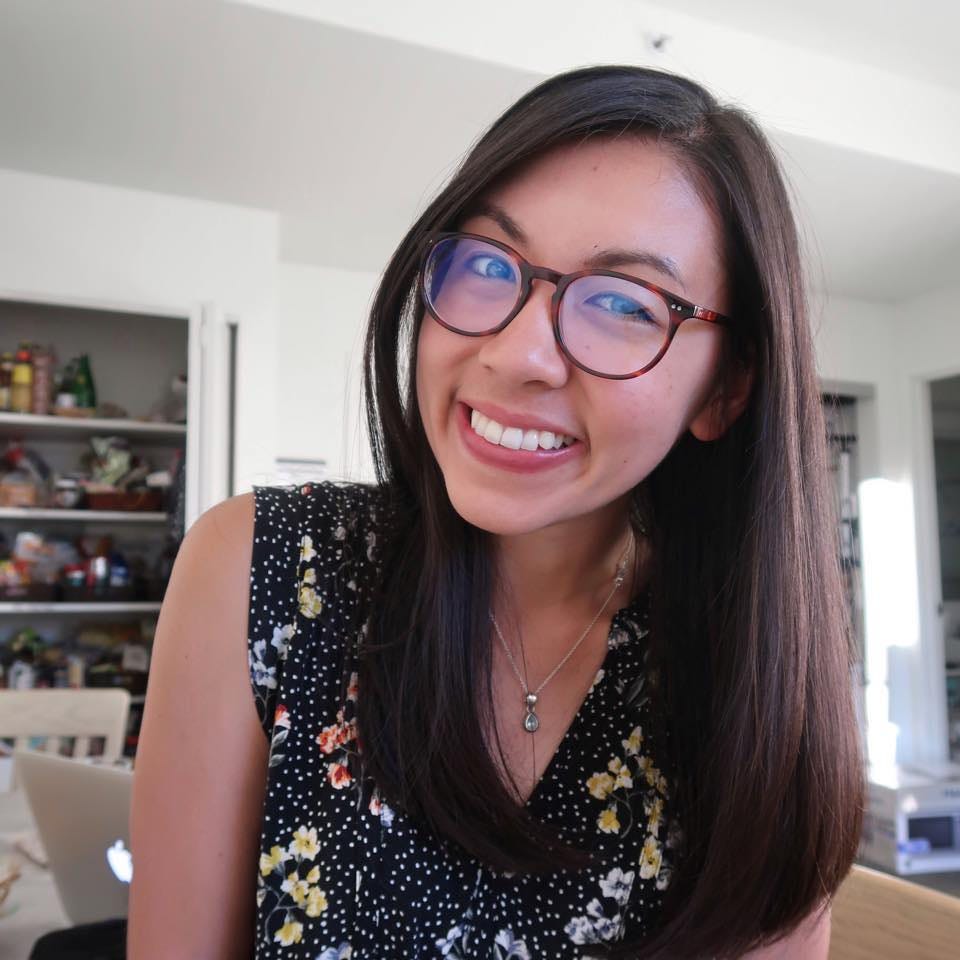Meet Your Newsletter Editor and Our New Monthly Newsletter!
Hi! I’m Amaris and I’m so excited to connect with you through The Unfolding: Slant’d’s monthly newsletter. Consider it your invitation to explore the vibrant world of AAPI creativity and celebrate our community’s truth in all its complexity.
My hope is that in this space, we can all share stories that bring us closer to each other and to our authentic selves. Each month, you can expect:
An honest, heartfelt Letter from The Editor (that’s me!);
Our Stories, Our Slant: a spotlight on a piece of art or writing from a member of the AAPI community that moved us;
Creatives in Conversation: our signature interview series about AAPI creatives on their journeys of self-discovery through artistic expression and creative activism; and
The Spark: a curated trio of AAPI culture recommendations, thoughtful writing prompts, and highlights from recent Slant’d events to ignite your imagination.
A Little Bit About My Own Creative Journey
Just a year ago, I was a BigLaw attorney working in a high-rise office in downtown Chicago. Despite entering law school with zero connections or background in the law, I had successfully broken into corporate America as a second generation half Malaysian-Chinese, half Polish woman. I had made it. I had fulfilled my immigrant parents’ dreams of earning two Ivy League degrees, a prestigious title, and a six-figure salary, and I had also proven to myself that I could overcome debilitating self-doubt to become the first lawyer in my family.
Yet within less than a year of arrival, I felt empty, disconnected, and racially isolated.
I wondered what had become of the girl who once derived a lifeline from reading and writing stories, who yearned desperately to belong to a creative community. The pressures of corporate law seemed to have crushed that girl out of existence.
So one day, I quit—no backup plan in place, just the visceral certainty that the terrifying sensation of free-falling into the unknown was infinitely preferable to the soul-sucking suffocation of staying.
Unemployment was brutal. Shame overwhelmed me in those initial weeks. I avoided mirrors, avoided my family’s questions. I knew I had to shed an identity built on values that did not correspond to me, yet the loss of my position’s social and material comforts was acutely painful.
To re-anchor myself to my sources of joy and rebuild myself from the ground up, I resumed the activities that lit my soul on fire: I began writing again, devoured novels and books on storytelling, and re-enrolled in dance class. I found work that allowed for balance. And I joined Slant’d as your Newsletter Editor.
What Slant’d Means to Me (and My Creativity)
I identify deeply with the values of our 100% volunteer-run creative collective.
Slant’d’s mission is to foster creative expansion in AAPI artists, to affirm alternative avenues of finding community, identity, and fulfillment, and to defy traditional publishing’s pigeonholing of AAPI stories into tales of racial trauma.
If you’ve ever told yourself that you’re not Asian enough, not American enough, or not good enough to create or have your story heard—we’re here to tell you: You belong here. Your story matters.
My journey to Slant’d necessitated that I first embrace the dissolution of a former identity, a former life plan, so that I could embark on a new kind of unfolding—through service and creative expression.
What ultimately healed me was connecting to myself and others through story: hearing the stories of others who related to my experiences, and rewriting the narratives I had been telling myself.
Happy National Poetry Month!
To close out Poetry Month, we’re republishing a haiku by one of our lit mag authors, Emily Villanueva, who wrote one haiku each day during quarantine about the wonders of the everyday. We hope this inspires you to try writing one, too!

Read more of Emily’s haikus in Slant’d Issue 05: Wonder or upgrade your subscription (all paid subscribers get access to our magazine archives!).
Meet Slant’d’s Lit Mag Poetry Editor: Vina Orden!

Why did you want to become Slant'd's Poetry Editor?
I’ve been an avid reader of poetry since high school, but writing poems is a relatively new practice that began during the pandemic and the Black Lives Matter protests and continued through two battles with cancer. Selfishly, I wanted to become Slant’d’s poetry editor to inspire and better my own writing practice. As an emerging Asian American poet myself, I understand the imposter syndrome that many of the poets we publish have about not considering themselves poets. It’s a great privilege to be in a position to throw the gates wide open and give many poets their first byline.
How has your experience been so far as a poetry editor?
I joined Slant’d in 2021 and first worked on Issue 05: Wonder. Collaborating with each poet-artist pair is just magic. I learn so much through workshopping a poem, from the way the poet wields language or arranges lines and caesuras/breaks, to the images and metaphors they invoke, to the way the written and spoken poem sounds. The artist often makes the poet and me see something new—the combination of words and art is a creation unto its own.
What types of poetry pitches excite you?
I’m excited by pitches that interpret the issue’s theme in unexpected and expansive ways. As an editor, I help hone the poet’s and poem’s unique story, voice, and strengths over the course of two or three drafts.
Do you have favorite poets, publications, or genres to recommend?
I’m drawn to contemporary BIPOC poets who connect the personal with larger histories, ideas, and visions. What most resonates with me in this moment are poems like Solmaz Sharif’s “Visa,” Paul Tran’s “Incident Report,” Jericho Brown’s “The Tradition,” Hanif Abdurraqib’s “The Prestige,” Craig Santos Perez’s “Love in the Time of Climate Change,” and Natalie Diaz’s “Manhattan is a Lenape Word.” I’m also working through the poetry collections The World Keeps Ending, and the World Goes On by Franny Choi and Caulbearer by Filipino poet Luisa A. Igloria.
Any tips or resources for aspiring poets?
Check out books in the poetry section of your local bookstore or library and read for what emotionally moves or transforms you. Especially in difficult times like these, I find it helpful to read and listen to poems on podcasts like Poem-a-Day (produced by the Academy of American Poets), Poetry Unbound with Pádraig Ó Tuama, The Slowdown with Major Jackson, and the Of Poetry Podcast with by Han VanderHart. I love using Allen Ginsberg’s “American Sentence” as a generative exercise—that is, encapsulating something you’ve observed or heard in a single sentence, seventeen syllables in length.
What is a fun fact about yourself?
Similar to Slant’d, I believe that creativity—whether writing or painting—is a form of activism. You can check out some of my “artivism” on my website.
Want to submit your art, questions, recommendations, or be interviewed? Email me or nominate yourself or your friends for an upcoming feature!
✨ Don’t miss your chance to submit to Issue 07 (theme: Lore) of our lit mag! All pitches are due tomorrow, 4/30! On the fence about submitting? We’ve included some submission tips, examples, and writing prompts to help:
👎 Debunking Harmful Submission Myths
Myth #1: “I’m not Asian enough to contribute my thoughts/stories/ideas.” FALSE! Our publications intentionally center the voices of creators of all Asian backgrounds (including mixed-race Asians and adoptees). You belong here!
Myth #2: “My story has to be an Asian story.” ALSO FALSE! We don’t exclusively publish stories about being Asian. If it’s a story by an AAPI, then that’s what counts!
🧧 Examples of “Lore”
My mother has 11 siblings, each named after a Chinese zodiac animal. My personal essay explores strife amongst the siblings, and how some demonstrate traits of their symbolic animals, while others actively defy them—the story asks “What’s in a name?” and will be structured as 12 vignettes that converge at the end.
My poem will be a conversation between my present-day self and the ghost of an aunt I’ve never met. I only know her through stories told to me by the women in my family. Themes include matrilineal connections across time and space, generational trauma, self-discovery, and more.
🔮 Writing Prompts to Spark Your Creativity
What are the stories, wisdom, heartbreak, joy, and legacies passed down across generations to you?
What tales have been carried across borders and seas, reshaped by new environments, and left in your hands to determine their futures?









